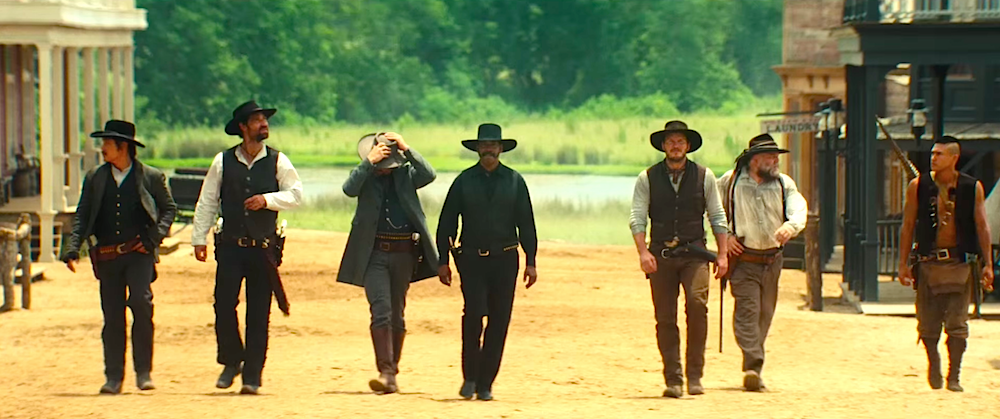
What if you got the opportunity to rework a contestable classic but had nothing to say? This is pretty much what The Magnificent 7 feels like. One can probably imagine the creative heads that cooked up this idea stemmed from the certified stone cold image of Denzel Washington as a mysterious gunslinger on a horse cloaked in black; an irresistible cinematic construct indeed. But that’s where this idea should have ended.
Fuqua’s re-imagining is a lamentably inert, mechanical Western that refuses to take a breath. Washington’s intro is ace, conjuring a laconic rhythm that Fuqua should have tried to mirror in the rest of the film. Asking that a director slow it down seems like a prosaic request to make these days but even if this was the case then that typically means having something good enough to explicate to fill those silences. Consequently, characters cultivate insubstantial psychological depth, relying on the debatable vestiges of parody. Fuqua may not be the most rousing of filmmakers yet Training Day spasmodically articulated a promise to grow. However, it did not take long for us to discover Fuqua is just as parochial in his approach to big budget high concept cinema as his contemporaries. Perhaps then it would be erroneous to set him apart, deploring his authorial limitations as singular in a cultural practice of artistic habituation.
A paralysing inertness arises from a half-baked script that lingers thoughtlessly on how best to regurgitate a litany of genre clichés. While the elemental simplicity of Kurosawa’s original idea marked The Seven Samurai as a classic, what Sturges got spot-on with his hip Hollywood updating, regardless of the detractors, was the accent on epic moments, something which is altogether absent from Fuqua’s lacklustre updating. The Magnificent 7 may foolishly signal diversity and progress in Obama’s post racial make-believe, but the tired, one-dimensional stereotyping reeks of a regressive cinematic imagination, infecting the lumbering narrative trajectory. Not only does the film refuse to develop the promising austerity tinged ideological machinations alluded to in the opening but points to a political acquiescence rendering both the racial and economic politics of the film a banal afterthought.
An extended opening and an even longer protracted ending means a middle section goes missing. Typical emotional investment by the audience never transpires. Instead relationships, characters and emotions are given to us in digestible bite size anachronisms, amounting to a type of corrosive creative contempt. Such contempt is mirrored in an altogether familiar aesthetic, stylistic monotony. Infuriating hyper edits, a terribly uninspired score by James Horner, stock action sequences and misplaced quips delivered with unusually poor comic timing by Chris Pratt may appear like minor quibbles but the culminating effect is a totalizing self-aggrandizement evident in contemporary popular culture. However, critical observations of this kind are not uncommon for high-end Hollywood cinema. If so, then how can the Western like Science Fiction, one of the few genres that accommodates for a transposition of anxieties, where genre subversion has flourished, come across as incredulous and oblivious to such faculties?
Since this reworking of The Magnificent 7 retains the title and the thrust of the narrative, then why abandon the original theme music for a completely redundant and forgettable score by Horner? I am not sure if this was down to an issue to do with rights or the distracting penance for nostalgic affectations but in my opinion Fuqua should have blasted Bernstein’s mythical music all over the place. At least give us some nostalgic satisfaction. Not only does the absence of the original theme music explain the lack of the requisite gratuitous money shot in which we dispiritingly never see our magnificent seven riding together but points to the absence of spectacle which a film of this scale should have been aspiring to, at least in spirit.
The film opens with a flawed panning shot, moving from left to right, an attempt to draw on the mountainous milieu of the American West and Frontier imagery. But what should have been a shot that lasted for much longer takes place hastily, striking a tone of artistic impatience. This instance points to the wider disjointed design of the film, problematizing the increasingly populist critical position often chosen when big budget Hollywood films fail to deliver, labelling them as passable, great fun, mildly diverting and so on. Even the mammoth shootout at the end is feebly conceived, the problems of filming a half-decent action sequence writ large once again. I should also briefly mention the villainous Bart Bogue; an apparition that lingers indistinctly, dwindling into a puddle of cowardly piss which may be wholly representative of the whoring capitalist tyrant archetype but fails to offer concrete oppositional ideological threat – it is all rendered as cinematic bluster.
If anything The Magnificent 7 is a star vehicle for Denzel Washington (with the long sideburns Washington is a ghostly reincarnation of Henry Fonda’s Frank from OUATITW) and the likely success of the film at the international box office is a continual reminder that he is probably one of the few American film stars who can still pull in a loyal crowd of filmgoers and justify being labelled bankable. Part of me hopes the film does well at the box office. We might get more Westerns. However, if they are all going to be as derisible as this then maybe we should stop right here.
Leave a comment